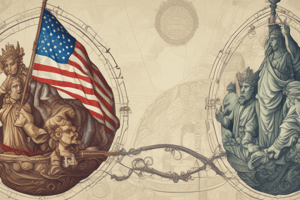Podcast
Questions and Answers
What is the study and comparison of domestic politics across countries called?
What is the study and comparison of domestic politics across countries called?
- International relations
- Economic development
- Political institutions
- Comparative politics (correct)
Define 'Power' in the context of politics.
Define 'Power' in the context of politics.
The ability to influence others or impose one's will on them.
Institutions in politics are only formal and have no informal aspects.
Institutions in politics are only formal and have no informal aspects.
False (B)
_______ is the means by which social scientists make comparisons across cases.
_______ is the means by which social scientists make comparisons across cases.
Which thinker conceived of an empirical study of politics with a practical purpose?
Which thinker conceived of an empirical study of politics with a practical purpose?
Flashcards are hidden until you start studying
Study Notes
What is Comparative Politics?
- Comparative politics is the study and comparison of domestic politics across countries
- Topics include: regimes, elections, culture, economic development
- Comparative politics is related to international relations, which studies relations between countries
Core Comparative Concepts
- Politics: the struggle in any group for power that will give one or more persons the ability to make decisions for the larger group
- Power: the ability to influence others or impose one's will on them
- Institutions: organizations or activities that are self-perpetuating and valued for their own sake
The Comparative Method
- A means by which social scientists make comparisons across cases
- Examples: studying democracy development in different countries, comparing political institutions across nations
Evidence and Theories
- Inductive reasoning: generating hypotheses from cases
- Deductive reasoning: testing hypotheses with cases
- Approaches: qualitative method, quantitative method, game theory, rational choice
Challenges Comparative Researchers Face
- Difficult to control variables
- Data-gathering limitations
- Multicausality, endogeneity, selection bias
- Area studies may overemphasize Europe
From Philosophy to Comparative Politics
- Early thinkers: Aristotle, Machiavelli
- Other major comparative thinkers: Hobbes, Locke, Rousseau, Marx, Weber
- Their contributions to political thought:
Approaches to Comparative Politics
- Modernization theory
- Behavioral revolution
- Critiques of traditional approaches
Guiding Concepts: Institutions
- Political institutions: organizations or activities that are self-perpetuating and valued for their own sake
- Formal institutions: based on officially sanctioned rules, e.g., citizenship, electoral systems
- Informal institutions: unwritten and unofficial rules, e.g., legislative norms, societal rules, and culture
Guiding Ideal: Reconciling Freedom and Equality
- Freedom: an individual's ability to act independently, without fear of restriction or punishment by the state or other individuals or groups in society
- Equality: a shared material standard of living shared by individuals within a community, society, or country
In Sum: Looking Ahead and Thinking Carefully
- Comparative politics is a constantly changing field of study
- Core debates: institutions, freedom, and equality
- Importance of thinking carefully about the complexities of politics
Studying That Suits You
Use AI to generate personalized quizzes and flashcards to suit your learning preferences.




